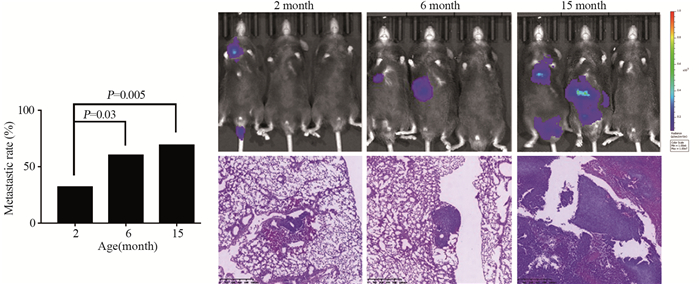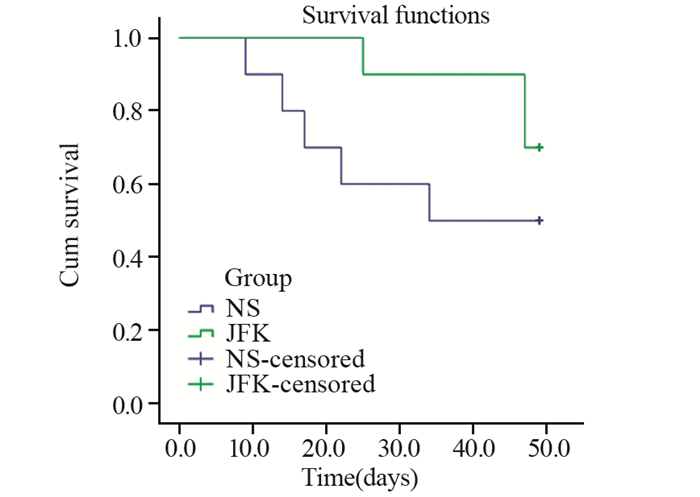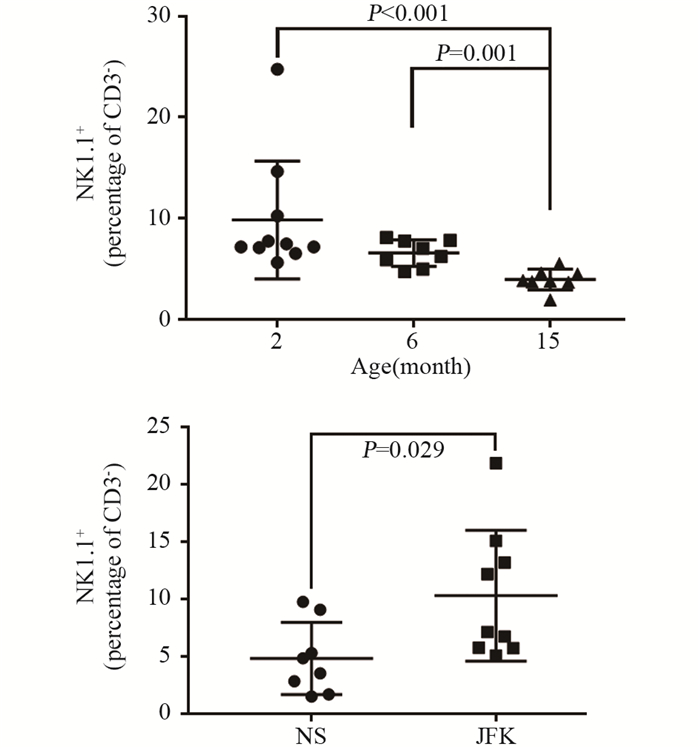-
摘要:目的
探讨免疫衰老对肺癌转移的影响,并揭示扶正中药金复康防治肺癌转移的作用机制。
方法不同月龄C57BL/6小鼠尾静脉注射Lewis肺癌细胞建立肺移植瘤模型;其中6月龄组小鼠采用金复康连续灌胃42天;观察小鼠肺部肿瘤转移情况;流式细胞术检测小鼠外周血中记忆T细胞、NK细胞比例的变化。
结果15月龄和6月龄小鼠较2月龄小鼠肺转移成瘤率显著上升(均P < 0.05)。外周血记忆CD4+T细胞丰度与小鼠年龄呈正相关(2月龄 vs. 6月龄,P=0.041;2月龄 vs. 15月龄,P=0.041)。NK细胞丰度与年龄呈负相关(2月 vs. 6月,P=0.009;2月 vs. 15月,P=0.009)。金复康给药组小鼠的生存期较0.9%NaCl组有延长趋势,但差异无统计学意义,而给药组外周血NK细胞水平较0.9%NaCl组显著升高(P=0.029)。
结论免疫衰老可促进肺癌转移发生,金复康延长小鼠生存期可能与延缓免疫衰老和改善NK细胞水平有关。
Abstract:ObjectiveTo explore the effect of immune senescence on lung cancer metastasis and reveal the mechanism of Fuzheng traditional Chinese medicine Jinfukang in the prevention and treatment of the metastasis.
MethodsA lung metastasis model of Lewis lung cancer cells was established in C57BL/6 mice with different ages (15 months, 6 months, and 2 months). Mice in the 6-month-old group were given Jinfukang intragastrically for 42 days. Pulmonary metastasis was analyzed by in vivo imaging, anatomical microscopic observation, and HE staining. The proportion of memory T cells and NK cells in peripheral blood was detected by flow cytometry.
ResultsThe lung metastatic tumor formation rate of 15-month-old and 6-month-old mice was significantly higher than that of 2-month-old mice (all P < 0.05). Abundance of CD4+T cells in peripheral blood was positively correlated with age (2-month-old vs. 6-month-old, P=0.041; 2-month-old vs.15-month-old, P=0.041; 6-month-old vs.15-month-old, P=0.953). The abundance of NK cells was negatively correlated with age (2-month-old vs. 6-month-old, P=0.009; 2-month-old vs.15-month-old, P=0.009; 6-month-old vs. 15-month-old, P=0.574). However, the survival time of mice in the Jinfukang group was longer (P > 0.05) and the level of NK cells in peripheral blood was significantly higher (P=0.029) than those in the normal saline group.
ConclusionImmune senescence can promote the metastasis of lung cancer. The prolongation of the survival time of mice administered with Jinfukang may be related to delaying immune senescence and increasing the number of NK cells.
-
Key words:
- Immune senescence /
- Lung cancer /
- Metastasis /
- NK cell
-
0 引言
鼻咽癌又称“广东瘤”,在我国南方发病率较高,其中男性发病率超过20/10万,女性超过10/10万。在东南亚、北非、中东和北极地区,以及亚洲和太平洋岛屿上的移民人口中,发病率略低于我国南方,而在世界其他地区,这一比率普遍低于1/10万[1]。随着调强放射治疗技术及同步化疗的应用,鼻咽癌的预后得到明显提高。目前Ⅰ期鼻咽癌患者5年总生存率高达96%,但局部晚期鼻咽癌患者5年总生存率仍不理想,远处转移是治疗失败的主要模式,相较T分期,N分期是影响远处转移的主要因素[2-5]。Xu等[4]报道181例经同步放化疗的局部晚期鼻咽癌患者预后,全组分3亚组T3~4N0~1M0、T1~2N2~3M0、T3~4N2~3M0 ,三组3年无远处转移率分别为89.6%、75.7%和76.3%(P=0.028),笔者认为在目前调强技术和铂类同期化疗的背景下,鼻咽肿瘤局部晚期(T3~4期)预后明显优于局部区域晚期(N2~3期),基于N分期的分层治疗较为合适。因此如何进一步提高N2~3期局部晚期鼻咽癌患者的总生存率,降低远处转移率是目前临床研究热点。本研究回顾性分析我院收治的N2~3期局部晚期鼻咽癌患者临床资料,探讨患者预后影响因素,比较不同新辅助化疗疗程预后差异。
1 资料与方法
1.1 临床资料
2012年1月—2013年12月广州医科大学附属肿瘤医院收治的18~70岁、病理证实、临床资料完整、临床分期为T1~4N2~3M0(UICC/AJCC第6版分期)的局部晚期鼻咽癌,剔除同时合并其他恶性肿瘤、存在严重的内科合并症、重要脏器(心、肺、肝、肾)功能不全的病例,共270例患者纳入本次研究。全部患者均有2~3种影像学检查以诊断鼻咽病灶及区域淋巴结的分期并排除远处转移(如肝转移、肺转移或骨转移等),包括鼻咽+颈部MRI、胸片、CT、PET-CT以及核素骨扫描。270例患者中,男200例、女70例,中位年龄46岁。局部病变分期手段:235例行鼻咽+颈部MRI、27例行鼻咽+颈部CT、8例行PET-CT分期。全组病理类型分为:鼻咽未分化型非角化性癌155例(57.4%)、鼻咽低分化型非角化性癌100例(37.0%),鼻咽角化性鳞癌15例(5.6%)。临床分期T1、T2、T3、T4分别为17例(6.3%)、93例(34.4%)、114例(42.2%)及46例(17.0%)。临床N2、N3分别为235例(87.0%)、35例(13.0%)。
1.2 治疗方案
新辅助化疗方案:化疗方案为DP(多西他赛75 mg/m2第1天+顺铂或奈达铂75 mg/m2第1天)、PLF(顺铂或奈达铂75 mg/m2+氟尿嘧啶300~500 mg/m2第1~5天+亚叶酸钙200 mg/m2第1~5天)、TP(紫杉醇175 mg/m2第1天+顺铂或奈达铂75 mg/m2第1天)及TPF(多西他赛60 mg/m2第1天+顺铂或奈达铂60 mg/m2第1天+5-Fu 500 mg/m2第1~5天),每3周重复。本研究将顺铂与奈达铂合计一组统计。全组依据NCT化疗疗程数分为:NCT≥3程(84例)、NCT=1~2程(106例)、NCT=0程(80例)患者分别为84例、106例和80例。
根治性放疗:采用调强放射(IMRT)技术,放疗剂量:原发病灶(GTVnx)70~72 Gy/30~32次,颈部淋巴结(GTVnd)64~70 Gy/30~32次,高危预防区(CTV1)60 Gy/30~32次,低危预防区(CTV2)50~54 Gy/30~32次;依据肿瘤消退情况,部分患者经放化疗后鼻咽残留病灶或转移淋巴结残留病灶局部加量8~10 Gy/4~5次,或行1次γ刀5 Gy/次。靶区勾画及正常组织的保护参照RTOG标准。同步化疗方案:顺铂或奈达铂每周(40 mg/m2第1天,共6~7程)或三周方案(75 mg/m2第1天,共2~3程),多西他赛+铂类(多西他赛75 mg/m2第1天+顺铂或奈达铂75 mg/m2第1天,3周方案,共2~3程)。放疗同期进行。本研究将放疗前7天内、或放疗结束后7天内化疗均定义为同期化疗。
1.3 统计学方法
统计分析采用SPSS19.0软件。定量资料比较采用Wilcoxon rank秩和检验,定性资料比较采用卡方及Fisher精确检验,采用Kaplan-Meier生存函数比较生存率、绘制生存曲线,各组生存率比较应用Log rank检验,Cox回归进行单、多因素分析。以P < 0.05为差异有统计学意义。
2 结果
2.1 化疗疗程资料
全组行5、4、3、2、1程新辅助化疗分别为1(0.4%)、2(0.7%)、81(30%)、101(37.4%)及5(1.9%)例,行单纯同期放化疗为80(29.6%)例。因本研究行5、4、1程新辅助化疗病例较少,故将行新辅助化疗3、4、5程合并一组,行新辅助化疗1、2程新辅助化疗者合并一组。不同新辅助化疗疗程临床资料比较,见表 1。
表 1 N2~3期局部晚期鼻咽癌患者不同新辅助化疗疗程临床资料比较n(%)Table 1 Comparison of cllinical data of stage N2-3 locally advanced nasopharyngeal carcinoma patients among three groups n(%)
2.2 全组预后
总生存期(OS)、无病生存期(DFS)、无局部复发生存(LRFS)、无远处转移生存(DMFS)均定义为从明确诊断日期开始到任一事件发生日期或末次随访日期。末次随访日期为2018年4月30日。全组中位随访时间63月(6~75月)。全组死亡57例(21.1%)。全组单纯局部复发6例(2.2%),2例颈部淋巴结复发,4例鼻咽原发灶复发,单纯远处转移54例(20%),同时出现局部复发和远处转移(鼻咽病灶复发+肺肝转移)1例(0.4%)。全组5年OS、DFS、LRFS和DMFS分别为78.4%、77.8%、97.7%和79.5%。
2.3 鼻咽癌患者不同疗程新辅助化疗的预后
鼻咽癌患者不同疗程新辅助化疗5年OS、DFS、DMFS差异有统计学意义,NCT≥3程新辅助化疗的预后明显优于另外两组疗程,LRFS差异无统计学意义,见表 2。
表 2 N2~3期鼻咽癌患者不同新辅助化疗疗程5年预后比较Table 2 Comparison of 5-year prognosis of N2-3 nasopharyngeal carcinoma patients among three groups
2.4 影响无远处转移率的单因素、多因素分析
单因素分析显示新辅助化疗疗程、N分期和年龄是影响无远处转移生存率的主要因素,见表 3。将单因素分析中有意义的临床因素进行多因素分析,结果提示新辅助化疗疗程、N分期、年龄均是治疗后有无转移的独立预后因素,见表 4。
表 3 影响N2~3期局部晚期鼻咽癌无远处转移率的单因素分析Table 3 Univariate logistic analysis of clinical factors for DMFS in N2-3 locally advanced nasopharyngeal patients 表 4 N2~3期局部晚期鼻咽癌无远处转移生存率影响因素多因素分析Table 4 Univariate logistic analysis of clinical factors for DMFS in N2-3 locally advanced nasopharyngeal patients
表 4 N2~3期局部晚期鼻咽癌无远处转移生存率影响因素多因素分析Table 4 Univariate logistic analysis of clinical factors for DMFS in N2-3 locally advanced nasopharyngeal patients
2.5 不良反应
全组均顺利完成治疗。其中NCT≥3程3~4度骨髓抑制者21例(25%)、NCT=1~2程28例(26.4%),NCT=0程23例(28.8%),差异无统计学意义(P=0.165)。
3 讨论
本研究结果显示NCT≥3程新辅助化疗的N2~3期局部晚期鼻咽癌患者的5年总生存、无瘤生存、无远处转移均优于行2程或单纯同期放化疗的患者,且可顺利完成治疗。
目前NCCN对局部晚期鼻咽癌的治疗推荐并无分层治疗,其建议对局部晚期鼻咽癌即临床分期为Ⅱ~ⅣB期即T1、N1~3M0或T2~T4、N0~3M0的患者治疗以同期放化疗为主,新辅助化疗+同期放化疗为2A类证据[6]。其2A类证据源于3项临床研究及一项Meta分析[7-10]。但三项对新辅助化疗在局部晚期鼻咽癌患者预后影响的临床研究中均对局部晚期鼻咽癌入组分期提出要求。Sun等[7]入组标准为Ⅲ~ⅣB期,除外T3~4N0M0患者,Cao等[8]入组标准则为Ⅲ~ⅣB期,除外T3N0~1M0期。Lee等[9]入组标准为Ⅲ~ⅣB期。三组研究均同时去除了Ⅱ期即T2N0-1M0、T1N1M0低危转移患者。Chen等[11]Meta分析纳入9项研究共1 988例鼻咽癌患者,结果提示新辅助化疗+同期放化疗相比单纯同期放化疗可降低远处转移率(P=0.03)。笔者认为基于鼻咽癌复发转移模式的不同,即局部晚期T分期(T3~4)早N分期(N0~1)组患者更倾向局部治疗失败,而晚N分期(N2~3)早T分期(T1~2)患者更倾向出现远处转移,基于新辅助化疗对远处转移的控制,笔者认为新辅助化疗更适用于高危转移即晚N分期(N2~3)早T分期(T1~2)患者。
研究发现T、N分期对患者预后影响并不相同,相较T分期,N分期是影响远处转移、总生存的主要因素[4-5, 12-14]。Setakornnukul等[12]266例局部晚期鼻咽癌行NCT-CCRT及同期放化疗+辅助化疗的回顾分析发现N3患者在NCT中明显获益,远处转移危险系数较辅助化疗者为0.48。Chen等[15] 556例T3~4N0~3鼻咽癌患者,经单纯放疗,结果发现N0、N1、N2、N3的5年OS分别为73.98%、65.96%、57.58%、29.39%(P=0.0009),T、N分期均是影响总生存、远处转移的独立预后因素,但N分期是主要预后指标,T分期为次要相关因素。在目前IMRT放射治疗背景下,鼻咽癌局控率得到明显提高,本组仅复发7例,5年无局部复发率为97.7%,因此对局部晚期鼻咽癌依据N分期进行分层治疗较为合适。例如对高危转移的N2~3期患者行高强度诱导化疗+同期放化疗,低危患者行同期放化疗或2程诱导后同期放化疗等。
单纯对N2~3期局部晚期鼻咽癌的研究较少。Yin等[16]比较了不同同期化疗强度的128例N2~3期鼻咽癌患者预后,结果提示N2~3期鼻咽癌患者在同期放化疗中提高化疗强度可提高总生存率,降低远处转移率。Kawahira等[17]小样本回顾分析N2~3期局部晚期鼻咽癌,12例行TPF3程诱导化疗,16例行同期放化疗+辅助治疗,结果显示TPF诱导化疗组明显提高患者总生存、降低远处转移率,两组3年OS分别为94%、75%,两组3年远处转移率分别为0、26%。魏嘉旺等[18]认为N2~3期局部晚期鼻咽癌为系统性疾病,在就诊前已有相当部分病例存在微转移灶,高强度的新辅助化疗可杀灭微转移灶,提高该部分患者的总生存、降低远处转移率,该研究按照1:2:1比例以年龄、N分期、病理类型、NCT方案配对后,NCT≥3程、NCT=2程、NCT=0程分别有179例、358例、179例N2~3期局部晚期鼻咽癌纳入研究,中位随访58月后,三组5年OS分别为89.4%、81.6%、73.7%(P=0.000),5年DFS分别为83.2%、69.8%、64.2%(P=0.001),5年DMFS分别为86.6%、76.0%、68.3%(P=0.000)。本研究结果同上述两项研究,均提示对N2~3期局部晚期鼻咽癌患者提高新辅助化疗药物强度或剂量强度可明显降低该部分患者远处转移率,提高总生存率。
本研究局部复发率较低,5年无局部复发率高达97.7%。大部分文献报道鼻咽癌放疗剂量GTV为68~72 Gy/30~32次[7, 19]。分析本组数据,有61例(22.6%)行75~80 Gy的剂量,提示较高的放疗剂量可进一步提高局部控制率,但伴随高剂量放疗,放疗后遗症如放射线脑病、放射线中耳炎、放射线脊髓炎、激素分泌水平下降等可能进一步升高而严重影响患者生活质量。对高剂量放疗研究值得进一步探讨。
本研究提示年龄 < 50岁患者较易发生远处转移(P=0.009)。原因可能为:鼻咽癌为成人常见肿瘤,发病高峰年龄40~59岁,故在 < 50岁患者中发病可能预示肿瘤侵袭性较强,出现远处转移概率较高。有研究结果提示 > 50岁患者更易出现远处转移[3](P=0.025),但该研究仅行2程新辅助化疗,是否对总生存造成影响进一步影响年龄因素并不确定。
因本文为回顾分析,存在较多局限性:(1)样本量较少,全组仅270例,N3病例仅35例(13%);(2)病例存在一定程度选择偏倚。临床行3程及以上诱导化疗者多身体状态较好,医师评估可耐受化疗的患者;(3)本研究新辅助化疗方案多样,文献报道奈达铂在同期化疗中与顺铂同效果,但在诱导化疗中疗效是否相同并无文献报道[19]。本研究诱导化疗中将奈达铂与顺铂合并一组统计,可能对结果造成一定影响。
综上,N2~3期局部晚期鼻咽癌患者行NCT≥3程诱导化疗+同步放化疗可明显提高总生存、降低远处转移率。对局部晚期鼻咽癌分层治疗的前瞻性临床研究亟待探索。
Competing interests: The authors declare that they have no competing interests.作者贡献:姚望:实验设计和实施、文章撰写阙祖俊:实验指导、文章撰写指导姚嘉良、于盼、罗斌:协助实验设计和实施田建辉:科学问题提出、实验框架设计、文章撰写指导 -
-
[1] Siegel RL, Miller KD, Fuchs HE, et al. Cancer statistics, 2022[J]. CA Cancer J Clin, 2022, 72(1): 7-33. doi: 10.3322/caac.21708
[2] Fane M, Weeraratna AT. Normal Aging and Its Role in Cancer Metastasis[J]. Cold Spring Harb Perspect Med, 2020, 10(9): a037341. doi: 10.1101/cshperspect.a037341
[3] Palmer S, Albergante L, Blackburn CC, et al. Thymic involution and rising disease incidence with age[J]. Proc Natl Acad Sci U S A, 2018, 115(8): 1883-1888. doi: 10.1073/pnas.1714478115
[4] 李丹, 刘硕, 周莹, 等. 2007—2016年北京市东城区居民恶性肿瘤发病状况分析[J]. 中国肿瘤, 2020, 29(7): 490-496. https://www.cnki.com.cn/Article/CJFDTOTAL-ZHLU202007003.htm Li D, Liu S, Zhou Y, et al. Cancer Incidence in Dongcheng District of Beijing from 2007 to 2016[J]. Zhongguo Zhong Liu, 2020, 29(7): 490-496. https://www.cnki.com.cn/Article/CJFDTOTAL-ZHLU202007003.htm
[5] Lian J, Yue Y, Yu W, et al. Immunosenescence: a key player in cancer development[J]. J Hematol Oncol, 2020, 13(1): 151. doi: 10.1186/s13045-020-00986-z
[6] 田建辉. "正虚伏毒"为肺癌发病的核心病机[J]. 上海中医药杂志, 2016, 50(12): 10-14. https://www.cnki.com.cn/Article/CJFDTOTAL-SHZZ201612003.htm Tian JH. Discussion on the core pathogenesis of lung cancer with "deficiency of vital qi and hidden toxin"[J]. Shanghai Zhong Yi Yao Za Zhi, 2016, 50(12): 10-14. https://www.cnki.com.cn/Article/CJFDTOTAL-SHZZ201612003.htm
[7] 田建辉, 罗斌, 毕凌, 等. 非小细胞肺癌循环肿瘤细胞表达规律及其与"伏邪"致病关系的研究[J]. 上海中医药杂志, 2016, 50(1): 15-19, 33. https://www.cnki.com.cn/Article/CJFDTOTAL-SHZZ201601007.htm Tian JH, Luo B, Bi L, et al. Expression of circulating tumor cells in NSCLC and its relationship with "Hidden Pathogen"[J]. Shanghai Zhong Yi Yao Za Zhi, 2016, 50(1): 15-19, 33. https://www.cnki.com.cn/Article/CJFDTOTAL-SHZZ201601007.htm
[8] Sadighi Akha AA. Aging and the immune system: An overview[J]. J Immunol Methods, 2018, 463: 21-26. doi: 10.1016/j.jim.2018.08.005
[9] Kong F, Hua Y, Zeng B, et al. Gut microbiota signatures of longevity[J]. Curr Biol, 2016, 26(18): R832-R833. doi: 10.1016/j.cub.2016.08.015
[10] Biragyn A, Ferrucci L. Gut dysbiosis: a potential link between increased cancer risk in ageing and inflammaging[J]. Lancet Oncol, 2018, 19(6): e295-e304. doi: 10.1016/S1470-2045(18)30095-0
[11] Wang GC, Casolaro V. Immunologic changes in frail older adults[J]. Transl Med UniSa, 2014, 9: 1-6.
[12] Iatsenko I, Boquete JP, Lemaitre B. Microbiota-Derived Lactate Activates Production of Reactive Oxygen Species by the Intestinal NADPH Oxidase Nox and Shortens Drosophila Lifespan[J]. Immunity, 2018, 49(5): 929-942. e5. doi: 10.1016/j.immuni.2018.09.017
[13] Obrador E, Liu-smith F, Dellinger RW, et al. Oxidative stress and antioxidants in the pathophysiology of malignant melanoma[J]. Biol Chem, 2019, 400(5): 589-612. doi: 10.1515/hsz-2018-0327
[14] Qin L, Jing X, Qiu Z, et al. Aging of immune system: Immune signature from peripheral blood lymphocyte subsets in 1068 healthy adults[J]. Aging(Albany NY), 2016, 8(5): 848-859.
[15] 董静懿, 宁小晓, 王蕾, 等. 上海地区健康成年人外周血T淋巴细胞亚群参考区间调查[J]. 检验医学, 2014, 29(6): 617-621, 627. https://www.cnki.com.cn/Article/CJFDTOTAL-SHYY201406010.htm Dong JY, Ning XX, Wang L, et al. Investigation on the reference ranges of peripheral blood T lymphocyte subsets among healthy adults in Shanghai[J]. Jian Yan Yi Xue, 2014, 29(6): 617-621, 627. https://www.cnki.com.cn/Article/CJFDTOTAL-SHYY201406010.htm
[16] 刘嘉湘, 潘敏求, 黎月恒, 等. 金复康口服液治疗原发性非小细胞肺癌临床研究[J]. 肿瘤, 2001, 21(6): 463-465. https://www.cnki.com.cn/Article/CJFDTOTAL-ZZLL200106021.htm Liu JX, Pan MQ, Li YH, et al. Clinical study of Jinfukang oral liquid for treating non-small cell lung cancer[J]. Zhong Liu, 2001, 21(6): 463-465. https://www.cnki.com.cn/Article/CJFDTOTAL-ZZLL200106021.htm



 下载:
下载:





